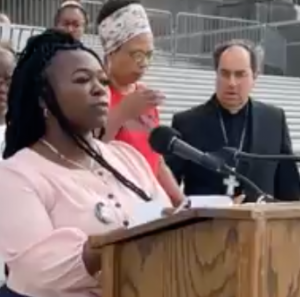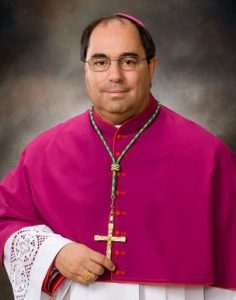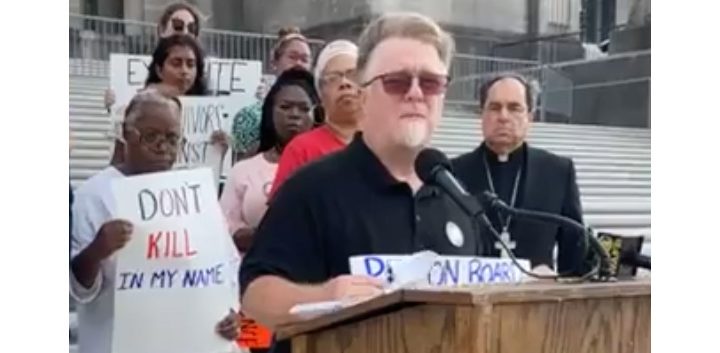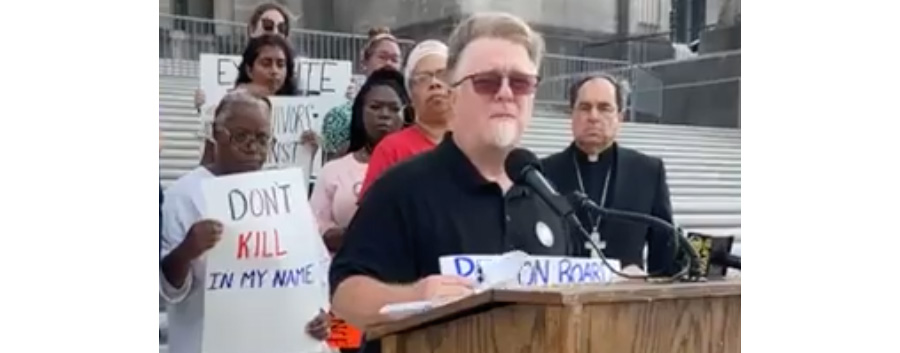Granting clemency to Death Row inmates would show the nation Louisiana is the staunchly pro-life state many claim it to be, death penalty abolitionists said during an Aug. 15 news conference.
The group of faith leaders, activists and relatives of murder victims and inmates gathered on the steps of the state Capitol Aug. 15 to urge the Louisiana Board of Pardons to reconsider its rejection of the 56 clemency petitions forwarded to it by Democratic Gov. John Bel Edwards last month.

Samantha Kennedy
“We urge the board to grant mercy over vengeance, and for the governor to continue to use his authority to grant clemency,” said Samantha Kennedy, executive director of the New Orleans-based Promise of Justice Initiative, which organized the event.
The clemency petitions seek commutation of the inmates’ death sentences to life in prison without possibility of parole, Kennedy added. All but one of Louisiana’s Death Row inmates filed a petition.

Marah Bowie
Marah Bowie, whose brother David Bowie is currently sentenced to death, pleaded with the board to connect the dots between saving the lives of the prisoners and those of the unborn in a state with one of the strictest abortion bans in the country.
“This window for clemency is a moment for Louisiana to show their value for human life,” she urged. “We hear about pro-life, and I hear about it all the time in other avenues. This is another example of what it means to be pro-life.”
But the petitions filed by inmates’ attorneys in June, and which Edwards recommended for hearings in July, face significant hurdles.
For starters, the board already rejected the petitions on the recommendation of state Attorney General Jeff Landry. He issued an opinion that the documents were filed after a deadline for clemency in these cases and because none of the prisoners currently has a scheduled execution date.
Another likely obstacle is the heavily conservative political culture in the state. Edwards declared his opposition to the death penalty in April, but the legislation he requested abolishing capital punishment died in a House committee in May.
And with the governor’s term ending in January, advocates sense time may be running out for the clemency bids and for getting the death penalty abolished in Louisiana.

Shareef Cousin
“This is an opportunity for us as a state, as a people and as a community to choose life,” said Death Row exoneree Shareef Cousin, who was 16 when sentenced to death in 1996 for a murder he didn’t commit and for which he was cleared three years later. “I am not the first person to be freed from Louisiana’s Death Row, and I hope I am not the last. I am pleading for the lives of these 56 men.”
Brett Malone said granting clemency would enable him to directly communicate with the man who killed his mother in 2000. “It’s been a very difficult journey over the last 23 years learning how to cope with the loss and the grief. Part of the healing is trying to reconcile what happened and getting to know a little bit more about the person who is responsible for my mother’s death.”
Malone said he is eager to know what the man’s life was like growing up and to hear what he has learned and experienced while serving on Death Row. “Because of the way the death penalty system is set up, there really are no avenues for us to have any kind of direct dialogue. So, part of clemency is really about giving an opportunity to the survivors of these crimes to work on reconciliation, to work on healing the wounds that were created through those actions.”

Bishop Michael Duca
Bishop Michael Duca of the Catholic Diocese of Baton Rouge said the church is committed to ending the death penalty in Louisiana and across the nation because killing leads only to more killing.
“Violence has a kind of ripple effect. It ripples out, first of all, to the families most directly involved. And we cannot imagine the loss and the pain that is caused. But it ripples out to their extended families and to their neighborhoods. It ripples out to the families of the ones who committed the crimes, as well. You do not stop that ripple with more violence. You stop it by stopping the violence.”
It’s also important to act before any of the inmates is assigned an execution date, Duca added. “Now is the time for a change. I hope and encourage those involved to move forward with these clemencies so that we can become a state that abolishes the death penalty completely, and so we can move forward for justice without violence.”
Related articles:
Opposition to death penalty gaining steam through broad coalition
These Christians are praying for an end to the death penalty
He was wrongly put on Death Row and believes you could be too
Her ‘Damascus Road’ led to campaign against the death penalty
How I came to oppose the death penalty | Opinion by Stephen Reeves
Image of the cross led him to oppose death penalty
Momentum is building to stop an execution in Oklahoma


